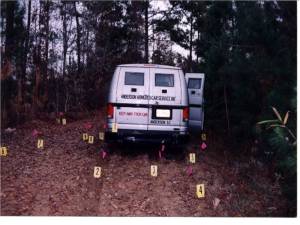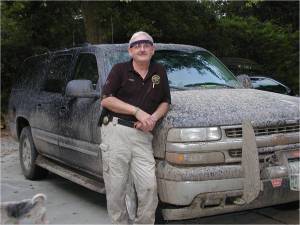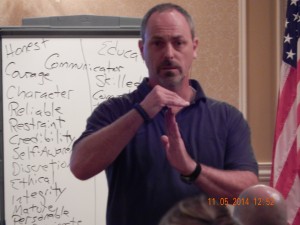Category Archives: Police Dynamics
The third virtue of the Ten Virtues of a Law Officer states:
(I will purpose to) refrain from vulgar, obscene, coarse, or offensive language that may offend others…
This is one of those virtues that will likely rub some police and correctional officers the wrong way. After all, bad language is so ingrained in our culture, no matter how crude or offensive to others it may be. Some argue that it a coping mechanism, others that street-language is necessary when dealing with street-thugs. However, professionalism demands that we control our tongues. Failure to do so is not only unprofessional, it shows a lack of discipline and character (not to mention a limited vocabulary)…
The first night I ever rode in a police car as a 16 year old kid (in the front seat, not the back), I remember the officer telling me that I was free to “take anything home” that I learned at the police station, except for the language. Well, guess what I took home? That’s right, the language. It was some years later, as I was contemplating marriage and raising a family, that I realized I needed to clean up my language. It wasn’t that hard and I am so glad I did.
Now, I’m not advocating that we become a bunch of prudes. That’s not realistic and probably not particularly desirable. But we do need to clean up our language. If we don’t do it, the courts will likely do it for us. This doesn’t mean that we won’t let an expletive slip every now and then. But it does mean that crude language and coarse joking should not be the norm.
I remember when I was Sheriff that the best compliment I would get on the deputies and staff was the lack of foul language. And many of our staff, particularly some of the ladies, would often tell me how refreshing it was to work in an environment that was free of crude talk and sexual innuendo. Not only is taming the tongue good character and good policy, but it also insulates you from a potential sexual harassment charge.
The Character First! definition of deference is:
Limiting my freedom so I do not offend the tastes of those around me
No where is this more important than in the area of our speech. Resorting to foul language, even during a street confrontation, is rarely necessary and generally shows a lack of tactical communication skills and an amateurish approach to generating voluntary compliance.
Sheriff Ray Nash
Police Dynamics Media
The second virtue of the Ten Virtues of a Law Officer states:
Maintain a humble attitude that is reverent and grateful in spirit, even in the face of resistance and disrespect…
Operating under authority, keeping you ego in check, and remaining respectful even in the face of disrespect is the essence of professionalism and distinguishes the true professional from the amateur…
(I apologize for the poor quality of the video. I am trying to find the right camera settings for the low light conditions in my hooch…)
When I was a young police officer, I remember my father telling me, “In my opinion, the best police officer is the one who has learned to balance his authority with humility.” At the time, I didn’t appreciate the wisdom and power of my Dad’s statement, but he was absolutely right. And in retrospect, it is the very essence of the Police Dynamics message: keeping your ego in check by operating under authority. There’s power there, as well as protection – the fundamental role of authority.
Let’s talk about respect for a moment. I can’t tell you how many law enforcement officers I have trained in the past who will say something like, “I’ll be respectful to them as long as they are respectful to me!” You want to know what that is? Amateur hour, that’s what! Anybody can be respectful if the other person treats them with respect. But the professional response is to be respectful even in the face of disrespect.
And isn’t this what gets so many law enforcement and correctional officers in trouble? Maybe the actions were legally justified, but the disrespectful attitude of the officer came through in what he said, and, more importantly, HOW he said it. And that’ what sank him in court. To quote Dr. George Thompson of the Verbal Judo Institute again, “What YOU say can and will be used against YOU in a court of law…!”
It goes back to not taking things personally. An officer operating out from under authority is being ruled by his own ego. He takes any resistance or challenge to his authority as a personal affront… then takes it out on the person he perceives as being disrespectful. But the professional law officer has learned to put his ego aside so he can take things professionally, not personally. That’s what I mean by cultivating a humble spirit. And it’s also what my Dad meant by balancing your authority with humility.
It’s not easy and it doesn’t come naturally. But it IS the essence of professionalism.
Sheriff Ray Nash
Police Dynamics Media
The first of the Ten Virtues of a Law Officer deals with the Dynamic of Authority. A professional, ethical law officer must faithfully represent those authorities placed over him. Here is the text of the first Virtue:
Always remain submissive to those in authority over me, in faithful obedience, realizing that I do not represent myself, but the trust of the people, the authority of the government, and the ideals of the police profession.
Oftentimes we fail to recognize what the term “submissive” really means. It is not a wimpy term. It is a military term that means operating “under the mission” or “under authority.” It is a powerful term that describes a military force ready to enter into battle. Dr. George Thompson of the Verbal Judo Institute recognizes it as the Art of Representation. It is the essence of integrity: being who you represent yourself to be. The uniform, the badge, the patch on your sleeve are meant to represent something — something much bigger than you are.
As a professional law officer you represent the law, you represent the department, you represent the government, you represent the ideals of the police profession, you represent the Constitution, … and you represent the people. The one thing that you don’t represent is yourself. Your goals, your agenda, and your ego are irrelevant to the accomplishment of the police mission.
True obedience, faithful obedience, is more than just following directions. Character-based obedience means “fulfilling the expectations of your authorities,” and it is much more powerful than just taking orders. Check out this Character Bulletin from Character First! to learn more about character-based obedience. It features the Dorchester County Sheriff’s Office (while I was still serving as Sheriff) to highlight this important principle.
Regretfully, terms like obedient and submissive are often misconstrued by law enforcement officials and treated as insults. I mean, what self-respecting law officer wants to be known as the “most obedient” or the “most submissive’ officer on the force? This can indicate a blindspot. By that I mean that your own character flaw may cause you to react to the same flaw in others.
Think for a minute about the most disobedient officer you know on the force (hopefully not you). The one who is always bucking authority and rebels against authority at every opportunity. What sends him into orbit faster than anything else when he is dealing with someone on the street? Disobedience to him!
So the next time you find yourself reacting (or over-reacting) to someone else’s character flaw, take a minute for some self-reflection. You might find that that very same character flaw is evident in your own life … and you don’t even know it. That’s what I mean by a blindspot…!
Click on this link to download a full copy of the Ten Virtues of a Law Officer.
Years ago (1999) I wrote the Ten Virtues of a Law Officer which is a character-based code of ethics for law enforcement professionals — not meant to supplant other codes of ethics that are out there, but to approach it from a different perspective consistent with the message of Police Dynamics. Here, in my first video post from the US Embassy in Kabul, Afghanistan and just a week after the attack of September 13 (warning – graphic photos), I offer an introduction to the Ten Virtues.
Over the next several weeks, I plan to post a video training clip on each of the virtues as a guide for law enforcement professionals (Please forgive the quality of the video. I am still experimenting with the video settings on my camera to deal with the poor lighting in my hooch)…
The Ten Virtues start with:
As a member of the law enforcement profession, I pledge to honor the sacred trust placed in me by God and the community I serve by guarding the thoughts and attitudes of my heart as I purpose to:
In a religious context, the definition of profession means an act of taking vows or declaring an oath. In a secular context, profession means a calling that requires specialized knowledge or credentials. In other words, to be considered a profession there must be a Professional Body of Knowledge, a Professional Body of Ethics, and a Professional Body of Standards that are enforced by a regulatory agency such as a POST, Police Officer Standards and Training, Board.
Law enforcement is a profession in every sense of the word (except for one). We have a Professional Body of Knowledge, a Professional Code of Ethics, and Professional Standards that are enforced by a regulatory agency. We just don’t get PAID as professionals…!
According to Romans Chapter 13, law enforcement is a “ministry of God.” When a law officer takes the oath of office and says “so help me God” it’s got to mean something. If you don’t believe there IS a God, if you don’t believe there is a Supreme Being to whom we are held accountable for how we conduct ourselves in the is life and how we administer the authority that has been entrusted to us, then those words don’t mean very much, do they? A minister is simply one who serves. As a law officer, you have been called into the ministry of law enforcement. And you have been entrusted with a tremendous amount of authority from the citizens you serve. It really IS a sacred trust.
As a law officer you have power and authority to take away at least four things. Under the right circumstances you have the power to take away life, to take away property, to take away freedom, and to take away children. No one else in our society has that kind of authority. “He who has been given a trust must prove himself faithful.” That is the essential message of the Tarnished Badge.
It all starts with our heart – our motivation. The three root character flaws – anger, lust, and greed – originate there. It’s so important for us to guard the thoughts and attitudes of our hearts. So as a professional law officer – one who has been called into the ministry of law enforcement, one who is truly faithful, one who is true to the oath of office, one who is true to the authority entrusted to him – we MUST purpose to do certain things. These are the Ten Virtues.
I use the word purpose because it means we will not do it perfectly. Understanding our own frailties, shortcomings, and character flaws, we are all works in progress. But we must endeavor to do these things. We must endeavor to live a life of character and faithfulness. That’s what the Ten Virtues are all about: endeavoring to honor the badge, endeavoring to honor the trust, keeping our egos and evil desires in check. So we can be the professional law officers we have been called to be…
I recently received this email message from a student of Police Dynamics and aspiring law enforcement leader from a western Sheriff’s Office asking for advice. I thought my other readers might like to read his request and my response…
Hi Ray,
I’ve been with the department for 6 years now in the detention facility and am now attending the Law Enforcement Academy. I have been elected as the president of my class, and am wondering if you have any guidance you can provide as to how I can be an effective leader. I know you have a lot of experience and hope that you can share some of that with me.
Here is my response…
I would be glad to help in any way that I can. Just the fact that you have sought me out shows a lot about your character and potential as a leader. First of all, good leaders are humble, teachable, and always putting the needs of others first. Leading by example is not an outdated idea. It is the essence of leadership.I have always sought to model my own leadership style after others that I admire. Historical figures, like George Washington or Stonewall Jackson, have been great inspirations to me, as well as living examples who have mentored me over the years. One caveat is that current mentors will oftentimes let you down. They are only human too. So take the good and learn from the bad that you find in them.Read, read, read. There is so much out there on leadership and I suggest you find books and/or videos from authors who you respect. Look for those that approach leadership from a character-based perspective. Steven Covey has some great stuff as does John Maxwell. Doug Dickerson, who is a frequent guest-poster on the Police Dynamics blogsite, offers an excellent book you might want to consider. I have an e-book that is available for sale on the site that you might also consider. Training courses are also good. Take advantage of all that you can.Remember this, the greatest leader who ever lived said, “I came not to BE served, but TO serve” and “He who would be the greatest among you must become the servant of all.” Follow this principle and you can’t go wrong. Look for ways to serve others, to help them achieve their goals, and to become more successful. Leadership will come when you are ready. It sounds like you are well on your way with the class presidency. Find ways to serve your fellow classmates instead of yourself and you will stand out in a positive way.Please stay in touch and let me know if there is any other way that I can help you along your path. But also remember this: the path of leadership is the path of MOST resistance. There is heartache and struggles ahead for the true leader. But for those who are called to it, there is no other way…!Ray
In this segment from the Police Dynamics Video Training Series, I demonstrate how to use the character quality definitions from the Character First curriculum to motivate and praise those under your authority.
After watching this video, every time you find yourself saying “good job” or “keep up the good work,” it should serve as a red flag. Realize that you have just praised someone for achievement instead of character, make the character connection by coming up with at least one character quality the person displayed, then praise them for the character quality as well. This will remind them to keep up the good character…!
 Shortly after I took office as Sheriff of Dorchester County, we experienced a tragic crime. An armored-car was hi-jacked and one of the guards brutally murdered. Due to an intense investigation and some top-notch forensic work, we were able to identify the murderer and successfully prosecute the case.
Shortly after I took office as Sheriff of Dorchester County, we experienced a tragic crime. An armored-car was hi-jacked and one of the guards brutally murdered. Due to an intense investigation and some top-notch forensic work, we were able to identify the murderer and successfully prosecute the case.
Right after the jury came in with their verdict, I sought out my Detective Sergeant (now a Lieutenant) who had handled the crime scene and forensic portion of the case. I knew the conviction was largely due to his efforts and I wanted to recognize him for a job well-done.
So I found him out back of the courthouse and went up to praise him as any good Sheriff should. But instead of praising him for his achievement (gaining the conviction), telling him “good job,” or “keep up the good work,” I praised him for three character qualities. By “pitching” these character qualities, right across the plate so he could catch them, I made the “character connection” and ensured that I sent the right message.
Gaining the conviction was the achievement–the fruit. Character qualities like attentiveness, thoroughness, and diligence were the seeds that produced the fruit. If you focus on the fruit and neglect the seed, you can produce a bad crop. It’s the Law of the Harvest. According to our Character Maxim, if you focus on achievement to the exclusion of character, you encourage bad character.
Watch this short video excerpt from the Police Dynamics Video Training Series as I demonstrate how to use character-based praise to encourage high achievement.
Praising character over competence requires a new vocabulary. The 49 character qualities defined by Character First provide an excellent tool.


